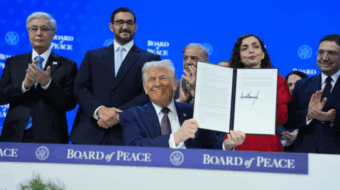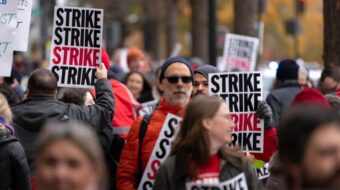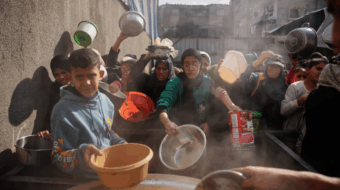It’s been a big week for those seeking an end to the 42-year-old U.S. blockade against socialist Cuba.
Openly defying the U.S. embargo, the 14th U.S./Cuba Friendshipment caravan arrived in Havana on July 19 with 80 tons of humanitarian aid, including pediatric medicines, defibrillators, hospital beds, other medical supplies, computers, ambulances, and school buses. The caravan, which was organized by the interfaith Pastors for Peace, gathered the medical equipment and supplies while traveling through more than 100 U.S. cities in the first part of July.
Caravan organizers, headed by Rev. Lucius Walker, Jr., deliberately refused to seek U.S. Treasury Department licenses to bring the aid to Cuba. “The U.S. government uses licenses to paint a pretty face on its genocidal policy,” said Walker in a statement. “As people of faith and conscience, it is our duty to expose this cruel contradiction.”
The caravan includes an “Elders Brigade” of senior activists and clergy who will be meeting with their Cuban counterparts.
Arriving almost simultaneously with the Friendshipment caravan were two other groups: the Cuba-U.S. Youth Friendship Exchange (see PWW 7/19) and the 34th contingent of the Venceremos Brigade, a U.S. solidarity group that will work with Cuban workers to renovate a health center. The Venceremos Brigade, too, did not ask for a U.S. Treasury Department license.
“We have many political points of view,” a Brigade statement reads, “but we are united in opposing the travel ban and the U.S. economic blockade of Cuba. …We believe that current U.S. policy towards Cuba is deceitful, misguided and harmful to the interests of our people and the Cuban people.” Among other things, the Brigade urges support for bills to end the travel restrictions, HR-2071 and SB-950.
On another front, the U.S. Senate Appropriations Committee approved an amendment offered by Sen. Byron Dorgan (D-N.Dak.) making it easier for exporters to visit Cuba to arrange sales of agricultural products. These sales, made on a cash-only basis, have been permitted by a limited trade agreement. The fate of the amendment remains unclear, although its backers are optimistic about its passage.
July 26 marks the 50th anniversary of the attack on the Moncada garrison, celebrated in Cuba as the beginning of the Cuban Revolution.









